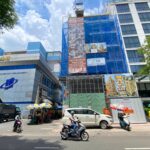Reversing the Reform Spirit: A Debate on Land Registration Procedures
The Ho Chi Minh City Institute of Natural Resources and Environment Economics has proposed restructuring provincial land registration offices (LROs) as the sole entities responsible for handling all land and resource-related matters, including first-time issuance of land-use certificates (red books). This implies that commune-level authorities would not handle land-related tasks, except for duties like land clearance, land leasing, and land-use purpose conversions within their jurisdiction.
Alternatively, some suggest relocating LROs to commune levels for greater public convenience.
In an interview with VietNamNet, Mr. Nguyen Chi Thanh, Vice Chairman of the Vietnam Real Estate Brokerage Association, emphasized that consolidating two administrative levels aims to bring governance closer to the people, enhancing service delivery. Thus, transferring land procedures, including red book issuance, to ward/commune levels is entirely logical.
“The closer the document processing unit is to the people, the more convenient it becomes. The government delegates authority to ministries, sectors, and provinces; further decentralization to wards/communes is reasonable. Reversing this by centralizing tasks at higher levels contradicts the reform spirit. If district-level offices previously handled land procedures, well-equipped commune/ward offices can certainly manage them,” Mr. Thanh asserted.
 Divided opinions on whether land procedures should be centralized at the provincial or commune level. Photo: H.K |
Meanwhile, economist Dr. Nguyen Minh Phong argues that for optimal public service, relocating LROs to local levels is ideal. However, incomplete data systems and decentralization mechanisms mean some authority remains at the provincial level.
Dr. Phong suggests that initially maintaining provincial LROs ensures safety. In the future, considering regional specifics—especially in vast areas where provincial offices require citizens to travel hundreds of kilometers—local branches or commune-based reception points could balance state management goals with citizen convenience.
“Provincial LROs could establish satellite offices or reception points in communes or commune clusters, harmonizing administrative objectives with accessibility,” Dr. Phong proposed.
Clarifying Provincial and Commune Roles
Prof. Dang Hung Vo, former Deputy Minister of Natural Resources and Environment, noted that initial land-use certificate issuance was historically decentralized: provinces handled organizations and religious entities, while districts managed households, individuals, and communities.
Prof. Vo explained that subsequent transactions like transfers, gifts, or inheritances could be managed by LROs. However, the primary challenge lies in preparing data for first-time certificate issuance. Both provinces and communes require agencies to verify eligibility, but involving LROs (under the Department of Agriculture and Environment) in preparation has historically deterred district officials from approving cases due to jurisdictional ambiguity—an unresolved legal issue.
He stressed that communes also need dedicated units for initial certificate preparation. However, fully transferring LROs to commune management is impractical, as enterprise and organization-related files remain under provincial/district control. Land management demands specialized expertise.
Prof. Vo advocates for clear role separation between provincial and commune levels. Both should have affiliated units preparing initial certificate applications, with communes handling household, individual, and community cases. Given current administrative scales, communes (roughly one-fourth of former district sizes) can manage tasks previously handled by districts.
Post-initial issuance procedures would remain centralized at provincial LROs.
By Nguyen Le
– 05:45 24/11/2025
Resolving Local Governance Challenges: Overcoming Obstacles at the Commune Level in Two-Tier Local Administration
The Government’s Steering Committee urges local authorities and party committees to prioritize the restructuring of organizational apparatuses and the enhancement of staff, civil servants, and public employees at the commune level. This critical and urgent task must be substantially completed by December 2025, with a focus on resolving existing challenges.
Land Registry Office: To Keep or Relocate to the Commune?
While the Ministry of Agriculture and Environment, along with the Land Management Bureau, propose transferring the authority, functions, and duties of provincial-level Land Registration Office branches to the commune level, the Ho Chi Minh City Institute of Natural Resources and Environmental Economics recommends maintaining the current structure. Their rationale highlights the unique complexities inherent in the natural resources sector, particularly the highly technical nature of land resource management.




















